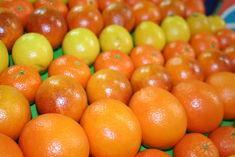
Spanish citrus producers are gearing up for a new season, which gets into full swing in late November. The season is expected to be good but, as always, growers are up in arms about what they perceive as “hypocritical” European legislation regarding the “unfair” competition from Morocco.
This is a contentious subject, and one Juan Bautista Juan Gimeno from Cítricos Valencianos feels strongly about. “Moroccan fruit is different because their treatments are different, they use chemical products that aren’t allowed in Spain,” he claims.
“EU legislation is very hypocritical. It doesn’t demand the same standards for fruit from different origins. We need new, less discriminatory, legislation or else we run the risk of losing the Spanish citrus industry, while the Moroccan citrus production is multiplying.”
It would seem unlikely that the Spanish citrus production would vanish, though the Spanish are keen to point out the fact that the hourly rate for citrus workers in Spain is around €8-9, the same amount Moroccan workers make in a day.
So are importers not aware of the situation? “Most UK buyers are not that concerned with provenance, as long as nutritional standards are met,” claims Juan Gimeno, and adds that the German discounters are the worst in terms of pricing. “When we have slightly lower volumes, like this year, the least they can do is pay a fair price.”
Apart from EU legislation, Juan Gimeno also has grievances with the domestic policy, namely the agricultural grants system, which should be revised, he thinks. Grants are paid out to farmers based on land area, and Juan Gimeno points out that the person who receives the most subsidies is “probably the Duchess of Alba”, Cayetana Fitz-James Stuart. The octogenarian royal is said to be worth around €600 million and be able to travel from one end of Spain to the other without having to leave her own country estates. “The agricultural subsidies should incentivise quality, not be based on the amount of land you have,” says Juan Gimeno.
In terms of foreign markets, Russia is very interesting, he thinks, as are the Middle Eastern countries if you invest time and build up a relationship with buyers. “They don’t want to play second fiddle.”
The Middle East is a tricky destination to export to though, due to the distance. “Because it’s so far away, oranges and lemons are fine, but fruits with a shorter shelf life are difficult,” he says.
Brazil is another growing market. “It’s an emerging market but it is functioning well,” according to Juan Gimeno.
China, however, is a market shrouded in a certain degree of mystery. “China has a very stringent protocol. It won’t allow imports into many harbours, so huge amounts of fruit enters Hong Kong and it seems then sent to other areas of China... It’s curious,” is all he will say.
In terms of what Spain can offer these markets, there is some exciting new product development currently underway, especially in terms of new easy peelers, to extend the season of late varieties. For example Anecoop Clemensoon and Muñoz La Ory, both licensed varieties. “There is still a gap in the market for clementines, and our clients want fruit all year round,” Juan Gimeno explains.
But will North African growers get there first? “Other countries supplying our clients out of season is not damaging to us; on the contrary, what is damaging is the competition from Morocco. ” —